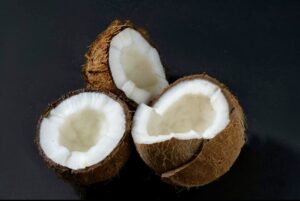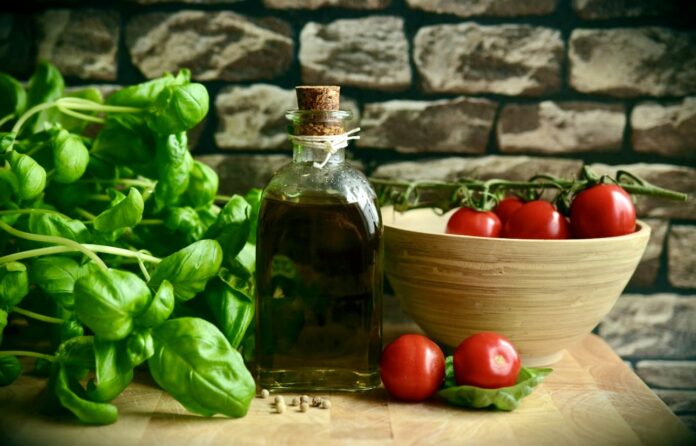In the vast expanse of culinary history, few ingredients hold as much mythic allure as Extra Virgin Olive Oil. It’s not just a mere cooking staple; it’s a journey through time, a story woven into the fabric of Mediterranean culture and a secret elixir whispered to grant longevity. But as modernity intersects with tradition and the world becomes increasingly health-conscious, a challenger emerges – extra virgin coconut oil. So, let’s delve into the world of these two culinary heavyweights, exploring their rich histories, medical benefits, sustainability, and more.

Liquid Gold: The Rich History of Extra Virgin Olive Oil
Olive trees and olive oil have a very colourful past! From the mythical tales of Greek gods to their practical uses in ancient civilisations, olive trees have played a crucial role throughout history: its branches are an instrument of mediation with the divinity; its fruits divine nourishment and cure for our mortal coils; and its gnarled appearance inspiration for poets.
According to Greek mythology, the gods decided to have a direct contest: the deity who would bring the most useful gift to mortals would have the right to create a city and become its patron. Poseidon conjured forth a spring of seawater, while Athena, in a stroke of brilliance, gifted the olive tree, meeting Zeus’s preference for peace and prosperity. Thus, Athens was born.
From religious ceremonies to Roman gladiators, olive oil was praised for its health benefits, symbolising peace, wealth, and glory. Its versatility extended to soap making, fuel for oil lamps, and even as a lubricant for machinery.
With its rich history spanning thousands of years – the most ancient olive trees can be found in Italy, Greece, Lebanon and Israel and are from 2,000 to 6,000 years old! – olive oil has remained a staple in everyday life, revered as “liquid gold” for its myriad uses.
Coconut Oil: The (Not so) New Kid on the Culinary Block
In Southeast Asia, where it originates, the Coconut tree shares a similar heritage and reverence with the Olive counterpart. In recent years, coconut oil has emerged as a darling of the wellness world, touted for its unique composition of medium-chain triglycerides (MCTs) and potential health benefits. Advocates of coconut oil claim that its MCT content can boost metabolism, aid in weight loss and provide a sustainable source of energy. With its antimicrobial properties and skincare benefits, coconut oil has carved out a niche in the realm of wellness, albeit facing scrutiny in the debate over its health merits compared to olive oil.
Health Benefits: A Comparative Analysis
Both olive oil and coconut oil offer distinct medical benefits, each with its own unique composition and effects on health. Extra virgin olive oil, rich in monounsaturated fats and antioxidants, has been extensively studied for its role in reducing the risk of heart disease, stroke, and inflammation. Its proven track record in improving cholesterol levels and regulating blood sugar makes it a staple in the Mediterranean area.
On the other hand, extra virgin coconut oil’s MCTs have been touted for their potential to boost metabolism and aid in weight loss. While it may offer benefits for skin and hair health, its impact on heart health and disease prevention is not as powerful as extra virgin olive oil, which is a key component of the Mediterranean diet, a dietary pattern of modern denomination but with a millennia old development history, renowned for its numerous health benefits and longevity-promoting effects: its emphasis is on traceability, the absence of ultra-processed food and dishes, fresh fruits and vegetables, lean proteins, and healthy fats. As a result, the risk of chronic diseases, including heart disease, diabetes and cancer, significantly decrease.
It is not a coincidence that Italy is a leading example of a varied and balanced Mediterranean diet, in fact it boasts the largest number of olive tree cultivars in the world: around 540, which represent 40% of the olive tree cultivars present in the world while Spain, which boasts a higher production of olives and oil than the Bel Paese, has 14% of the total.
In particular, Puglia, the region stretching east from the ankle to the heel of the Italian boot, is renowned as the “golden heart” of Italy’s olive oil production. Boasting a rich culinary heritage and a long-standing tradition of olive cultivation, Puglia exemplifies the essence of Italian EVOO craftsmanship, with its 32 types of olive cultivars and distinctive flavours, a sensory journey through the region’s gastronomic delights is definitely guaranteed: from the sweet and delicate Cellina di Nardo’ to the spicy and intense Coratina, the variety of olive oils produced in Puglia showcases the diversity and quality of Italian Extra Virgin Olive Oil.

Sustainability: Navigating Environmental Impact
Beyond their health benefits, the sustainability of extra virgin olive (EVOO) and coconut oil (EVCO) production is a pressing concern in an era of heightened environmental awareness. Coconut oil production, concentrated in biodiverse tropical regions, poses a significant threat to biodiversity due to deforestation. Therefore, when considering EVCO production, it’s essential to address the environmental implications associated with its cultivation: one significant concern revolves around the potential impact on biodiversity given that coconut plantations often replace natural ecosystems, leading to the loss of habitat for indigenous species, moreover this disruption can have far-reaching consequences, including dwindling populations of pollinators and other organisms reliant on the original habitat. Likewise, the use of pesticides and fertilisers in coconut farming presents another environmental challenge since these chemicals can leach into the soil and water, posing risks of contamination to these vital resources and adversely affecting nearby ecosystems. Ultimately, unlike olive oil, the terms “virgin” and “extra virgin” are not regulated when it comes to coconut oil.
On the other hand, advocates and marketers of alternative products to extra virgin olive oil voice their concern over the environmental impact of the production, characterised by water-intensive cultivation because of freshwater usage and land use. Certainly, olive trees are thirsty crops that require substantial amounts of freshwater for irrigation hence contributing to water-stress in regions where they are cultivated. However, compared to EVCO production, extra virgin olive oil production has a lower impact on biodiversity and land use, as the trees are perennial plants that do not require replanting each year so, let’s face reality, the biggest challenge faced by olive growers is global warming.
The Mediterranean Basin, a hub of olive production, is particularly vulnerable to the effects of climate change: rising temperatures and reduced rainfall levels threaten olive tree health and productivity and without adequate adaptation measures, such as irrigation, olive crops may become economically unsustainable in some regions by 2031, according to studies. Additionally, invasive pests like the olive fruit fly and olive moth pose a growing threat, facilitated by changing weather patterns.
Despite these challenges, farmers are resilient, exploring innovative solutions like water-collection systems to mitigate the impact of climate change on olive production. However, the stakes remain high, with Italy alone boasting 150 million olive trees, supporting a multi-billion euro industry and hundreds of thousands of businesses.
At the end of the day, both oils present sustainability challenges but EVOO production offers certain advantages, particularly in regions with old-growth trees that require less water and organic farming practices. Therefore, by seeking out reputable sources and prioritising sustainable production methods, consumers can minimise their environmental footprint and support responsible oil production by making an informed choice when debating over the eternal dilemmas of cost, quality, environmental sustainability or foodie trends, whether in the aisles of a supermarket or at a farmer’s market stall.
Navigating Adulteration and Quality Control
As for all precious resources, the production of EVOO faces challenges like adulteration and mislabelling.
Last November, authorities in Spain and Italy, in collaboration with the EU’s Europol law enforcement agency, made significant arrests, detaining 11 individuals associated with a criminal gang responsible for producing and distributing adulterated olive oil. They confiscated 12 barrels containing approximately 260,000 litres of fake oil, along with an additional 5,200 litres of falsely labelled market-ready oil. This illicit operation, characterised by false labelling and the mixing of olive oil with other oils, underscores the profitability of fraudulent olive oil production.
Various factors contribute to the proliferation of counterfeit olive oil, one is the age-old, insatiable appetite of the large-scale retail distribution industry competing to achieve the lowest purchase price in spite of everything else. The other factor is Mother Nature: rising demand for Mediterranean EVOO exports clashes with diminishing production rates due to extreme weather conditions, as noted by Coldiretti, Italy’s primary farming organisation. Weather extremes, such as an extremely wet spring followed by record-setting summer heat in 2023, led to a 41% decrease in Mediterranean oil production, exacerbating supply shortages and driving prices higher. These conditions provide fertile ground for criminal enterprises, so called “AgriMafia,” to thrive by exploiting gaps in the market. To make matters worse, fraudsters resort to tactics like adding chlorophyll or beta carotene to mimic the characteristic colour of EVOO, further deceiving consumers. The consequences extend beyond economic losses; the integrity of the olive oil industry and consumer trust are at stake. The illicit practice not only poses a public health risk but also undermines the reputation and hard work of genuine olive oil producers and the broader economy.
Despite the prevalence of fraudulent practices, discerning consumers have understood that the initiative always comes from the base and are taking steps to identify high-quality Extra Virgin Olive Oil, such as seeking out PDO (Protected Denomination of Origin) or PGI (Protected Geographical Indication) certifications and choosing organic or pesticide-free options.
Embracing a Culture of Conscious Consumption
As we navigate the complex landscape of olive and coconut oil, it is essential to approach our choices with mindfulness and awareness. While both oils offer unique benefits and culinary possibilities, Italian extra virgin olive oil stands out as a beacon of tradition, health, and sustainability. By honouring the rich history of extra virgin olive oil and embracing sustainable practices, we can cultivate a culture of conscious consumption that nourishes both body and planet. So, the next time you reach for a bottle of EVOO or EVCO, remember the stories woven into their rich tapestry and the impact of your choices on health and the environment. Buon appetito!
Ig – @fairness_mag

